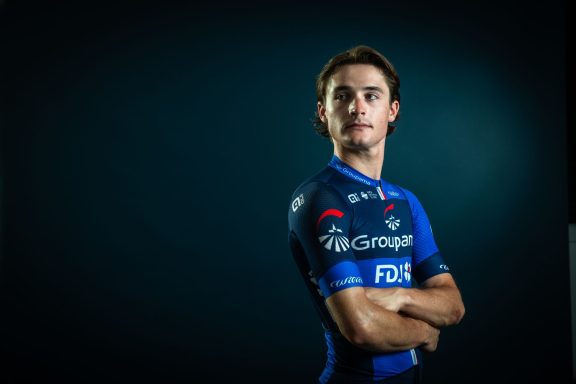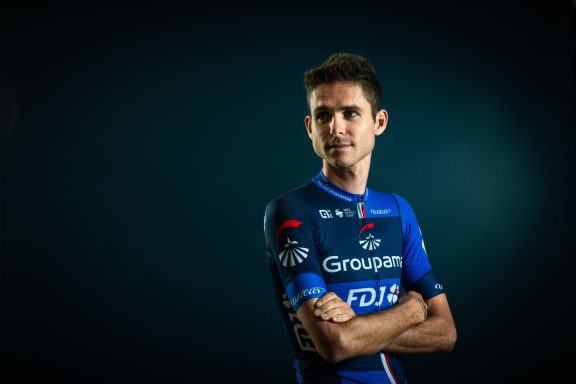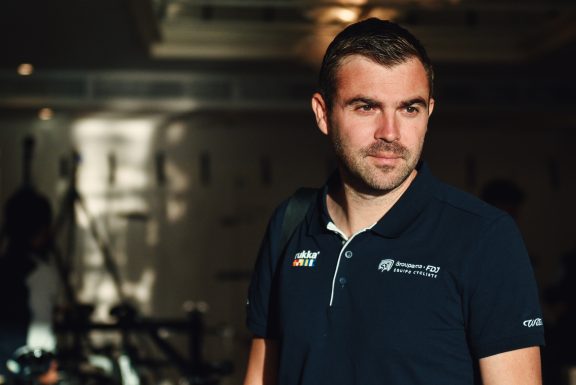Valentin Madouas’ end of the season promises to be intense and full of goals. At almost 24, the rider from Brittany is not only about to make his debut on the Tour de France, alongside Thibaut Pinot, but also to tackle the Classics, whether to perform or to discover. To sum up, this end of the season should also enable him to make another step in his development, both on a personal level and within the team.
Valentin, you are coming back from a personal training camp in the Pyrenees.
Indeed, I went to Saint-Lary-Soulan’s area in the middle of last week. I was with friends: Paul Ourselin, who is a pro, as well as Julian Lino and Léo Danes, two amateurs. There were also members of my family. The purpose was to start riding a bit in the mountains, to do some elevation meters but also to get a change of atmosphere. Due to my injury (jaw fracture, editor’s note), the lockdown and then the quiet resumption on the road, I stayed at home or around for a long time, and I personally rode almost three and a half months indoors. It was quite long. This training camp allowed me to see something else, to change training roads and to have fun riding the climbs one after the other. I also wanted to go back to the mountain for some time, and this period lent itself very well to it.
“A special emotion”
What did you and your coach David Han planned to do in this training camp?
The main goal was to do a great basics workload, which I had already started doing for two weeks at home. This camp allowed me to complete a good block but also to get used to the long climbs again and to do a work that I can not do too much at home. I had the opportunity to do strength and intensity exercises for slightly longer periods than what I can do at home, due to a very different terrain and topology (laughs). I was able to work on other things and do get nice fundamental basics back before the team’s training camp.
Four months after your crash, have you recovered your full capacities?
I don’t have problems anymore. I still have to take care of my teeth because one of them broke. Otherwise, everything is back to normal. Physically, I’m back to a very decent level. I feel good, even better than during a winter preparation. In comparison, I even rode more than in winter since I usually go on lessons and this is not a time when I can do a lot of fundamental work. Therefore, I really took advantage of this free time. I still lack a bit of rhythm and intensity to refine it all, but I’m pretty happy overall.
We guess that you’re also pretty happy with your first selection for the Tour de France…
It’s obviously a special emotion when you know that you’re going to participate in the most beautiful race in the world. In itself, it is certainly a bicycle race, but this one is very special. In the back of my mind, I thought I would do the Tour at least once in my career. So it’s a little recognition and it makes me feel very good. However, until it was officially announced, I didn’t necessarily want to believe it would happen. I didn’t want to put it in my head like it was done and be disappointed afterwards. Being among the first riders confirmed is a nice bonus. This will allow me to prepare peacefully, I don’t have to be in shape too early to win my spot, and I don’t have to do too much to prove that I am doing well. My goal is to be in good shape by the end of August.
“I feel something I have never felt before”
Do you feel any particular pressure by entering this group around Thibaut?
When you see the structure of last year’s Tour team, there weren’t a lot of changes possible. It seemed complicated to enter in such a close-knit and strong group, but I had said at the start of the season that I wanted to join them and compete in this race. If I said it, it’s also because we had talked about it together within the team, and we believed that I could be ready for it. Now, being selected is far from being an end in itself. The real goal is to be as strong as possible when the race starts. You have to know how to enjoy the emotions that a selection for the Tour brings, but you also have to know how to move on and refocus on work to get to the best level. For me, this selection goes inevitably along with some pressure knowing that I was not part of the adventure last year. They took habits and lived real things together. So it will be up to me to adjust to the group and not the other way around. The preparation races will help me in that regard. I will be able to settle quietly, but you obviously need to find your place when you join a group. I necessarily have a little pressure, but it is rather positive insofar as we go there with a major objective.
Is it exhilarating to be part of such an adventure?
I think the feeling will be stronger when we’ll gather, but it is true that I feel something that I have never felt before, because I have never taken part in a Grand Tour with a leader who can go for the final victory. To participate in such a great event with so much pressure is something that I want to discover with great interest. When you team up with a rider who can win the biggest race in the world, it only makes you want to do one thing: be the best you can be during the race and surpass yourself for him. One doesn’t have that kind of opportunity every year. We obviously don’t have as much pressure as Thibaut, but we still put a lot of pressure on ourselves to help him realize his dream and that of the team. We are all aware that we have an important role alongside him. The seven riders by his side will have put as much pressure on themselves as him beforehand, because we know it’s a mandatory step towards success. The “only” difference is that he will also have to handle the external pressure.
“I hope the Tour will take me to the next level and open up opportunities”
What role do you expect in the group?
As I said, it will be up to me to adapt. At the moment, I don’t know yet what specific work I will have to accomplish. I did not have the opportunity to talk about it with everyone because we did not have training camp or gathering and my selection was only recently confirmed. That said, I think the team knows my abilities. They know what I can do. I’ve been on the team for three years; they know my strengths and my weaknesses. From there, I know that they will find a role that suits me and that will allow me to help Thibaut 100%.
Is doing the Tour also an opportunity for you to pass another milestone?
Definitely. I hope it will take me to the next level for the end of the season, especially, but also that it will open up opportunities for years to come. I hope the Tour will make me better. From what I was told, it is very different from other races. There is much more emotional pressure and many external parameters to deal with. The side issues are excessive compared to the other races. This is the area I will be able to progress on, because you have to live it to assimilate it. Thanks to Giro last year, I was able to situate my starting point on three-week stage races. From this point of view, I gained real experience and got to know myself over three weeks. At the end of the race, I knew I was able to do things that I didn’t necessarily feel able to do at the start. I will therefore be starting the Tour with much less doubt than if I had not raced any Grand Tour beforehand. On the other hand, the Tour will bring me a lot on many other aspects, that is for sure.
Is the goal also to observe and learn from a leader like Thibaut?
For sure. This is something that I have never experienced, so I can only learn from this Tour and this situation. I think I’m going to see things that I’ve never seen. There will be a lot of people around the bus, a lot of pressure on Thibaut’s shoulders. In these moments, it will be important to be able to learn from his way of handling things. It will be a continuous learning. At the start of his career, Thibaut himself may have struggled in managing all of this, but he has matured and he is now very strong in dealing with pressure and his emotions. He says himself that he would have liked to have someone like that at the start of his career, a Grand Tour leader, from whom he could have been inspired, because it would have saved him a lot of time. If he says so, it is not a coincidence.
“There will be great opportunities on the Classics, and we’ll need to seize them”
Until now, you haven’t ridden that much with Thibaut…
We still know each other a bit. We did a few races and we get along very well. When I joined the team, I was often with David, whom he was close to, and we got along well. I don’t know him very well yet because I have little racing experience with him but I don’t worry too much. I think we have characters that go well together. It will come naturally and quickly. In terms of racing habits, the Route d’Occitanie, the Critérium du Dauphiné and even the French championships will help to refine them. Casually, that will make about ten days of racing, moreover in quite an identical state of preparation. The habits that we will create at that time will therefore be similar on the Tour. And then, for the little that I raced with him, and from what I saw on TV, I already know what he wants and what he likes in races.
After the Tour, it will be up to you to take on responsibilities with the Classics…
Indeed, I’m looking forward to it and I also hope that the Tour will give me a lot of strength to be able to keep going on the Classics. In any case, it is the best possible preparation according to me. It will certainly be extremely important to recover well after the Tour and you will have to take your job really seriously for three months. Otherwise you won’t last the whole end of the season. This is what I intend to do. Having the Tour in the legs, I think there will be great opportunities in the Classics, and we will have to seize them 100%. I believe it is possible to be successful over this entire period. I have good recovery capacities and I have no problem motivating myself. The difference will be made on the recovery between the races. Between the resumption on August 1 and the end of the Classics in late October, it will be almost three months non-stop. It’s quite rare to have a racing period that intense in a normal season. To tell the truth, it reminds me of my amateur years, when we were racing every weekend. It’s actually also in order to get more strength, to be able to do a series of races and to recover more easily that I had done my last year in the amateur ranks.
How does one adjust to races so diverse than the Tour in high mountains, the Ardennes Classics and the cobbles Classics?
It can be difficult indeed (laughs). First and foremost, I think that I will need to switch mentally. Regarding the legs, I’m not worried. They will be good at the end of the Tour. I also plan to work on my qualities such as explosiveness before the Tour in order to be ready when the Classics come. That being said, it will certainly be different than usual. I think that the Tour of Flanders and Paris-Roubaix will not unfold as we are used to. Everyone will necessarily be on his last leg and there will therefore be big differences. It doesn’t scare me to be non-stop; you just have to be mentally ready to go into battle. And it’s easier to switch from the mountain’s pedal stroke to the Classics’ one than the reverse. The movement is more flexible and it’s easier to absorb the parameters. The sequence will also be nicer in the Tour-Ardennes-Cobbles order, in that the Ardennes seem to be a perfect transition between mountain races and cobbles ones. I would not have had the same speech if the cobbles Classics were located before. The adjustment to the terrain will be softer.
“This end of the season will be kind of a starting point”
Paris-Roubaix was not initially on your schedule. Why was it added?
It still fits in this learning and discovering process. Doing the Ardennes Classics was logical. I also wanted to keep the Tour of Flanders on my calendar and the team understood it very well. Then, there was the Paris-Roubaix question mark… We eventually thought that I could wait a week more to take my break and that it could be good that I experience the race this year already. If I am performing well so much the better, if I am not, I can only learn. It’s hard and it’s dangerous, but it’s also the last race of the year so I can go there without stress and pressure. It will really be a bonus. I mainly go to the cobbles Classics to observe and discover. However, it is not a lack of ambition since I would really like to be good on these races and I think that they can eventually suit me.
Should this end of the 2020 season enable you get more specific afterwards?
The purpose is not to have a concrete and defined idea at the end of the year. On the other hand, I think it will definitely help me in building my next racing calendars. It will be quite crazy to do everything: Tour, Ardennes, and cobbles. At the beginning, even I said to myself “holy cow, it’s going to be hard”. I will be able to assimilate new parameters and get an idea of the rider I want to become and the goals I would like to set for myself. By doing it all at once, I will be able to realize where I’m having the most fun and where I feel able to be the best. I will also have to be able to move from the teammate role to that of leader. It will be interesting, including in anticipation of the rest of my career. It will be kind of a starting point. If I can handle this, it will reassure me, allow me to have more specific goals and possibly become an even more complete rider than I think I am.



No comment